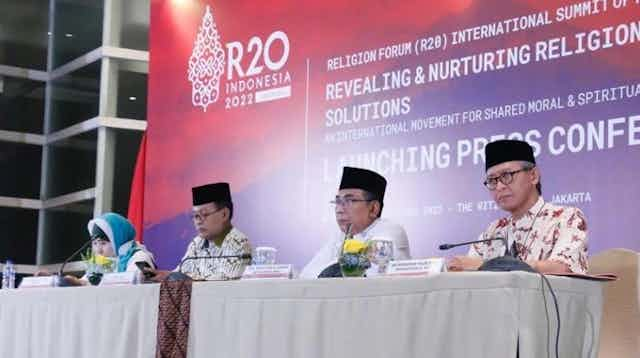Indonesia, home to the world’s largest Muslim population, will hold the G20’s first-ever Religious Forum Summit ahead of the upcoming G20 conference in Bali.
The “R20” forum has been organised by the country’s largest Muslim organisation, Nahdlatul Ulama (NU). The R20 aims to encourage discussions among global religious leaders to tackle issues of religious extremism, by promoting the value of human equality. The event is an opportunity to assert the role of religion as a source of solutions to global economic and political problems.
The event will bring together more than 400 participants, including 160 inter-religious figures from the world’s 20 largest economies.
Religious organisations invited to attend include the Roman Catholic Church, the Anglican Church, the World Evangelical Alliance, the World Muslim League – and, perhaps surprisingly, Rashtriya Swayamsevak Sangh (RSS), an Indian militant right-wing Hindu nationalist paramilitary volunteer organisation.
According to NU, the RSS has confirmed its attendance. As an international relations scholar who focuses on Indian politics, I consider the NU’s decision to invite the RSS as a positive move, despite the group’s role in violent conflicts between Hindus and Muslims in India.
How engaging Rashtriya can drive religious harmony
The RSS opposes “appeasing minorities, particularly Muslims” in India. Together with India’s ruling Bharatiya Janata Party, it has pushed for “Akhand Bharat”, a discriminatory geopolitical vision that tramples the historical narratives of Indian Muslims.
But involving RSS in dialogue could start a movement of interfaith harmony driven by religious communities. There are, though, several steps that NU needs to take with the RSS to ensure the forum’s goals are met.
First, NU should be fully aware that Rashtriya is still facing a huge challenge of moderating its religious and political thoughts. It is also still trying to contain extremist elements within its organisation.
So, NU should bring up topics on religious moderation between Rashtriya and Hindu communities at large, before any further talks between Rashtriya and Muslim communities take place. Indonesia can share its successes in maintaining its democracy and inter-religious harmony as a result of commitments by Muslim communities and organisations to practice and spread a moderate version of Islam.
Rashtriya is already showing signs that it is open to change and moderating its political position. Despite its endorsement of a series of “Islamophobic” policies, the RSS has recently intensified its engagement with Indian Muslim communities.
Second, NU should engage with like-minded groups promoting the ideas of moderate Islam, such as three Delhi-based organisations – All India Imam Organization, the Center for Peace and Spirituality, and All India Ulama & Mashaikh Board – as well as Kerala-based Markazu Saqafathi Sunniya.
NU should understand that the profiles of Muslim organisations are diverse in its spiritual authority, religious understanding and political positions. Thus, NU should be considerate in building engagements and alliances with Indian Muslim communities.
NU should not only focus on its engagement with Indian Muslim clerics, but also Muslim intellectuals who are known for their contribution to the Indian Muslim community. These figures include former Minister of State of External Affairs of India, Salman Khurshid; visiting fellow at Observer Research Foundation, Rasheed Kidwai; and secretary of Forum for the Promotion of Moderate Thought in Islam, A. Faizur Rahman.
At the R20 event, NU should emphasise that all religious communities must work together to tackle and fight against religious-based hatred. Efforts to sustain peace and build trust among conflicting communities should only be continued on the basis of eliminating the existing discrimination against not only Indian Muslim communities, but also other minority communities.
By implementing these approaches in the R20 forum, it is possible that NU – together with various religious organisations – could inspire meaningful changes that would contribute to building more cohesive societies, especially in conflict zones.
The challenges ahead for India – the next G20 host
As the world’s fifth largest economy and one of the biggest Muslim-populated countries, India needs to find a new way of thinking that could help mitigate the rising potential of conflicts between Muslims and Hindus.
NU, as the organiser of the G20’s Religious Forum meeting, could facilitate and mediate future engagements between the RSS and Indian Muslim organisations. NU could also help Rashtriya set a common framework together with Indian Muslim organisations, to agree upon issues ranging from historical enmity to political and economic inequality. Some Indian intellectuals have called for a new consensus that would transform the conflict-ridden relationship between Muslims and Hindus.
To be able to maintain its economic growth, India, which will host next year’s G20 presidency, needs to maintain its multicultural democracy and communal harmony, which are both needed to strengthen political and economic stability. Building a new consensus between Hindus and Muslims is one step India should consider to reach that economic goal.
Rashtriya should seriously consider the R20 forum and its engagement with religious organisations, including NU, as a way to heal the wounds still left from the communal conflict of the Partition in 1947.
The cohesiveness and mutual understanding between Hindus and Muslims in India is a precondition for India to become an emerging power and moral force in global politics.
Muhammad Maulidan from International Relation Studies of the Islamic University of Indonesia contributed to this article.


